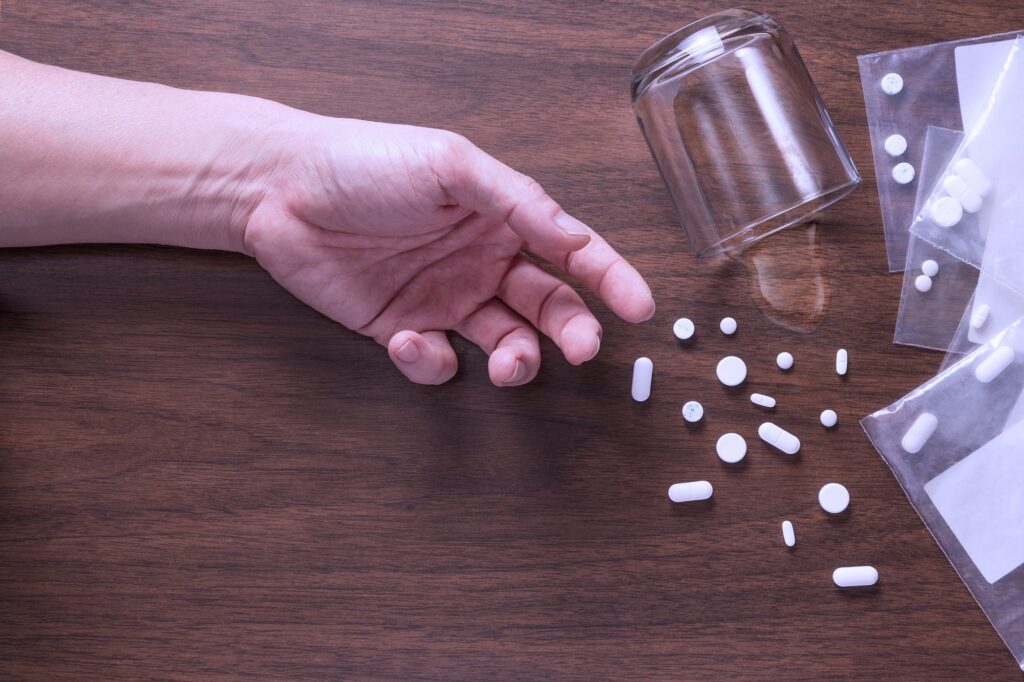Just one kilogram of fentanyl could potentially kill up to 500,000 people. Part of the problem is that it’s possible to take a pill but not know whether it contains a lethal dose of fentanyl. Some people may also unwittingly take a pill that secretly contains fentanyl.
Synthetic opioids like fentanyl are the main reason for overdose deaths here in the United States, so they’re not to be taken lightly.
Whether you’re addicted to fentanyl, or you know someone that might be struggling with an addiction, it’s crucial to understand the symptoms of a fentanyl overdose. You could save a life by knowing what to do, who to call, and how to get help. Use this guide and take that step.
What Is Fentanyl and Why Is It Dangerous?
Fentanyl is a synthetic opiate that doctors may prescribe to help patients with severe or chronic pain. When prescribed by a medical professional, it’s usually introduced into the system via a patch, shot, or as a lozenge.
Illegally produced fentanyl is usually sold as a pill or powder, put on blotter paper, and used in eye drops or nasal sprays.
Fentanyl depresses respiratory function and the central nervous system. And unfortunately, this fast-acting opioid is 80 times more potent than morphine and hundreds of times stronger than heroin.
Patients that are prescribed fentanyl are carefully monitored for any signs of abuse. However, misuse and addiction do happen. This illicit substance is often smuggled into the United States and sold illegally.
Alarmingly, fentanyl is also being mixed with other drugs to increase its potency, including cocaine, heroin, and methamphetamine.
It’s all too easy for someone to become a victim of a fentanyl overdose, either by knowingly taking it or by taking a prescription opioid secretly containing a lethal dose. Additionally, the more someone takes an opioid like fentanyl, the more the brain adapts to it. People that become addicted seek to continually take the drug to find pleasure.
Symptons of a Fentanyl Overdose
Part of what makes drugs like fentanyl so dangerous is that it causes a person’s breathing to slow or even stop. When the brain doesn’t get enough oxygen, people can suffer from hypoxia, which is a potentially life-threatening situation.
Fentanyl side effects include:
- Drowsiness
- Nausea
- Sedation
- Confusion
- Constipation
- Breathing problems
- Feelings of extreme happiness
- Loss of consciousness
Taking too much fentanyl can result in an overdose, which you can spot if you see the following:
- Constricted or pinpoint pupils
- Weak or no breathing
- Decreased heart rate
- Dizziness
- Confusion
- Vomiting
- Low blood pressure
- Choking sounds
- Clammy or cold skin
- Gurgling sounds
- Limp body
- Blue-colored lips or nails
Every day, more than 150 people die from synthetic opioid overdose, such as fentanyl. Unfortunately, fentanyl is extremely difficult to detect without test strips as it has no odor or taste.
How to Help Someone That Has Overdosed
If you suspect a fentanyl overdose, it’s vital that you act fast to save their life. Even if you’re unsure whether they’re just high, treating it like an overdose can prevent potentially fatal consequences.
First, call 911 as soon as possible. Many states have Good Samaritan or immunity laws in place that protect a caller or the individual that has overdosed from legal trouble. It’s always best to seek emergency medical treatment if you suspect an overdose.
Naloxone is an FDA-approved rescue drug that has the ability to reverse an opioid overdose. In most states, you can purchase it from a pharmacy without a prescription. In many cases, it’s the friends or family that administer this drug to save the life of their loved one.
Naloxone has the ability to restore normal breathing function within 2-3 minutes. However, anyone that has overdosed must still seek emergency treatment.
Move the person to their side so they don’t choke, and try to keep them awake. Remain with them until the ambulance has arrived.
Treatment Options for Those Addicted to Fentanyl
All drugs carry some risk of overdose, but fentanyl’s potency makes it particularly problematic. If you or someone you know struggles with fentanyl addiction, there is help.
Individuals going through addiction should admit themselves to a substance abuse program. Upon arrival, the first step is the detox process, which helps prepare individuals for further treatment.
Fentanyl addiction can have intense withdrawal side effects, which is why having trained and professional staff helping them through it is crucial to success. Patients can go through the therapy process in a clean and safe environment. They will also receive a personalized treatment plan, including set medication levels, specialized diets, counseling, and more.
Detox side effects can include:
- Diarrhea and vomiting
- Abdominal cramps
- Difficulty sleeping and insomnia
- Strong cravings
- Goosebumps and cold flashes
- Excessive sweating
- Muscles aches or spasms
- Anxiety
Although it isn’t easy to go through a detox process, it’s the first step in the recovery process and can help break the cycle of addiction and save lives.
Inpatient residential programs are also available to help patients overcome addiction and learn to lead healthy lives. These treatment programs are designed to comfort and heal and help get people back on their feet again.
Don’t Take the Risk
Fentanyl overdose is a very serious situation that requires prompt action if you want to save lives. Drugs like naloxone can help, but the only true solution is to get help.
Are you an individual struggling with fentanyl addiction or a loved one looking for rehab centers in San Diego? Apex Recovery Rehab is here for you. The first step on the path toward sobriety is to contact our staff.
Reach out to us, and one of our intake coordinators will help you start the process of recovery.

